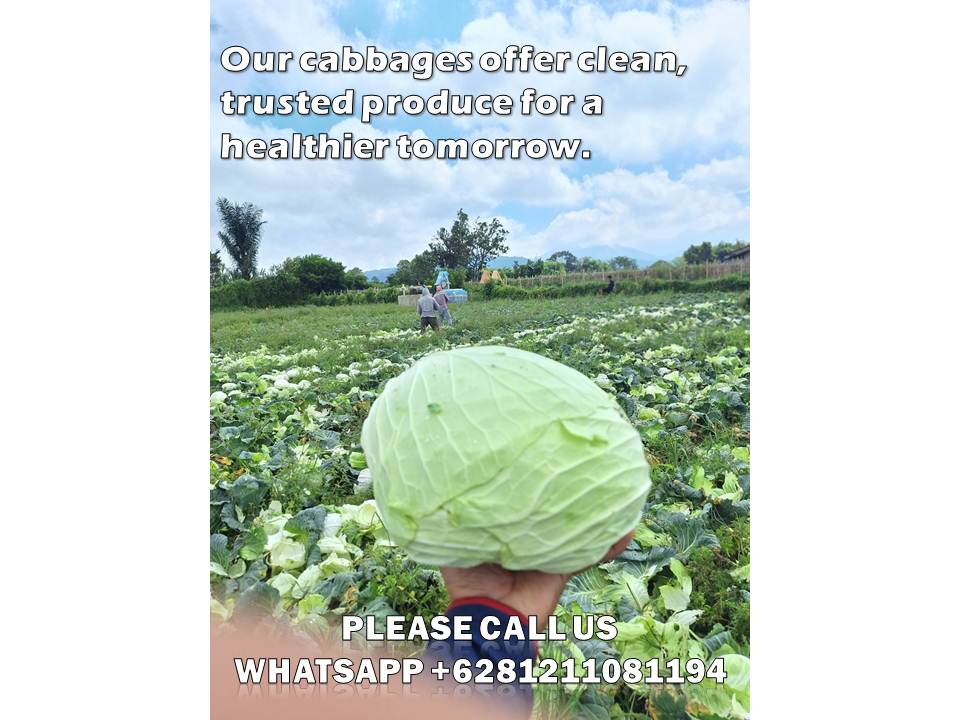Sustainable cabbage farming Indonesia is gaining recognition as an important practice balancing environmental care and high-quality vegetable production. Indonesia’s unique climate and fertile lands provide ideal conditions for cultivating cabbage sustainably. This guide explores innovative techniques, benefits, challenges, and future prospects of sustainable cabbage farming in Indonesia.
Why Sustainable Cabbage Farming Indonesia Matters
At the heart of sustainable cabbage farming Indonesia lies the goal to reduce environmental impact while maximizing yield and nutrition. Traditional farming often involves heavy pesticide use, soil depletion, and water waste. Sustainable methods promote soil health, biodiversity, and resource efficiency—ensuring land productivity for future generations.
By adopting these practices, Indonesian farmers contribute to:
- Reduced Chemical Use: Lower reliance on synthetic fertilizers and pesticides.
- Soil Conservation: Crop rotation and cover cropping enhance soil fertility.
- Water Efficiency: Drip irrigation and rainwater harvesting reduce water consumption.
- Increased Biodiversity: Natural pest control and intercropping support beneficial insects.
Indonesia’s Climate Advantage for Sustainable Cabbage Farming
The tropical climate of Indonesia, especially in highland areas like North Sumatra and Bali, provides ideal conditions for sustainable cabbage farming. Cool temperatures, abundant rainfall, and nutrient-rich volcanic soils help farmers grow high-quality cabbages year-round.
Innovative Techniques in Sustainable Cabbage Farming Indonesia
Farmers use eco-friendly methods to improve productivity while preserving natural resources. These techniques include:
Organic Soil Management
Organic fertilizers like compost and biofertilizers enrich soil health and support beneficial microbes, improving cabbage growth and yield.
Integrated Pest Management (IPM)
IPM reduces chemical pesticide use by employing natural predators, pheromone traps, and crop rotation to control pests.
Water-Saving Technologies
Drip irrigation and rainwater harvesting conserve water, preventing root damage and maintaining healthy cabbage crops.
Agroforestry and Intercropping
Companion planting with trees and other crops maintains soil moisture, enhances biodiversity, and diversifies farmer income.
Benefits of Sustainable Cabbage Farming Indonesia
- Environmental Protection: Preservation of soil and water quality.
- Higher Crop Quality: Healthier, more nutritious cabbages.
- Cost Savings: Reduced expenses from lower chemical use.
- Market Opportunities: Growing demand for sustainable vegetables globally.
Successful Case in Bali
Farmers in Bali have embraced sustainable cabbage farming methods, improving soil fertility and reducing crop losses through organic practices.
Challenges and Solutions in Cabbage Farming Indonesia
Climate Adaptation
Farmers adopt climate-resilient cabbage varieties and flexible farming strategies to cope with changing weather patterns.
Training and Knowledge to Support Sustainability
Many Indonesian farmers still rely on traditional methods. To improve sustainable cabbage farming, government programs and NGOs offer practical training, workshops, and field schools focused on eco-friendly techniques. These initiatives help farmers adopt organic practices, improve yields, and meet international standards. Support also includes digital tools and cooperative development to boost market access.
Technology Supporting Cabbage Farming Indonesia
- Soil Sensors: Optimize irrigation and fertilizer use.
- Mobile Apps: Provide weather updates and pest alerts.
- Cold Chain Logistics: Preserve cabbage freshness during transport.
Future Prospects
Driven by global demand and strong government support, sustainable cabbage farming in Indonesia is entering a new era of growth. As consumers around the world seek healthier and environmentally responsible food sources, Indonesia’s eco-conscious approach to cabbage cultivation is gaining international attention. Through improved farming techniques, better resource management, and investment in agricultural education, farmers are producing higher-quality crops while preserving soil and water ecosystems. This transformation not only boosts productivity and profitability but also strengthens Indonesia’s position in the global vegetable export market, making it a reliable partner for importers seeking sustainably grown cabbage.
Exclusive Cabbage Solutions for International Partners
Humaira Megah Abadi
Komplek Panggon Indah, Jalan Tentram No.129, Rengas Pulai, Medan Marelan
City: Medan, North Sumatra, Indonesia
Email: sales@medanexport.com
Phone/WhatsApp: +62 812 1108 1194
Website: www.medanexport.com
Partner with a Leading Sustainable Cabbage Farming Indonesia Exporter
Whether you require green cabbage, white cabbage, or custom packaging, our team delivers high-quality produce on time with full export support. We prioritize trust, transparency, and excellence in building lasting international partnerships.
Contact us for flexible packaging, competitive pricing, and reliable delivery schedules to keep your supply uninterrupted. Our export specialists ensure your cabbage arrives fresh and in perfect condition, empowering your business in a competitive market.
Email: sales@medanexport.com
Phone/WhatsApp: +62 812 1108 1194
Website: www.medanexport.com

